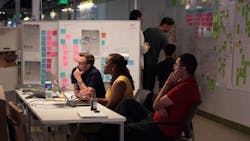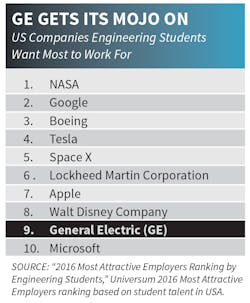Seeing the competition make a serious attempt to poach your best employees isn’t something that most companies would view as a particularly positive thing.
Not so for GE Digital.
The fact that some of the industry’s biggest software players are going after its talent is an affirmation today for GE that its massive efforts to transform its reputation for being an industrial manufacturer to becoming a digital industrial company are clearly paying off.
As manufacturers struggle to hire new talent, it’s even more remarkable that GE Digital is competitive in Silicon Valley, a place dominated by the Googles and Apples of the world. A far cry from its roots in heavy equipment manufacturing, its San Ramon Foundry is virtually indistinguishable from a typical, high-tech workspace--stocked with everything from markers and sticky notes to high-tech tools designed to help customers innovate and collaborate with GE to develop industrial Internet solutions.
High-tech companies aren’t the only ones with a growing awareness of GE's transformation. In a 2016 Universum survey of more than 70,000 engineering students at top universities across the globe, GE was the only industrial manufacturer to make the top ten list of best companies to work for, along with—take note—the likes of Google and Apple.
They stressed that GE would not have achieved its degree of success had they stopped at creating a new positioning statement, giving major credit to both the leadership team and HR for doing a fabulous job gaining an understanding of the cultural differences between the software world and the industrial world.
Also helping to propel GE Digital on its journey was the making of strategic hires--people with software in their DNA from the likes of Google and Amazon--for whom agile development and minimum viable product are second nature. HR also adjusted the pay and compensation structure in order to become more competitive in Silicon Valley.
No doubt all these factors are playing a role in GE’s ongoing transformation. But there’s something that GE has that other digital companies do not: Its strong roots in manufacturing things—MRI machines, jet engines, wind turbines and the like. Now also armed with new digital capabilities, GE is finding its mojo with a whole new generation of employees, who are seeking work that is more meaningful than creating a new “like” button.
As Richard Katz, a senior technical recruiter at Randstad Technologies who works with new engineering grads recently told me, “Whether it's working on renewable energy solutions or building medical equipment, this incoming generation of engineers wants to be part of something big, something that makes a difference in the world and benefits society. They don’t want to be working in a light bulb factory.”
The irony in that statement is delicious. GE got its start nearly 140 years ago, when Thomas Edison founded the Edison Electric Light Company--to make the first commercial incandescent electric lamp.
About the Author
Karen Field
Group Content Director
Karen Field is Executive Director, Content for Penton’s new Internet of Things Initiative. She has 25+ years experience developing content for an audience of technical and business professionals and a reputation for challenging conventional thinking and taking a novel approach in the creation of world class editorial and conference programming.
Most recently she launched the Internet of Things Summit at the Embedded Systems Conference and has covered the emerging issues associated with the Internet of Things extensively for EE Times, EDN, and Embedded.com.
Karen has a mechanical engineering degree and a master’s of business degree from the University of Minnesota and Boston University.

